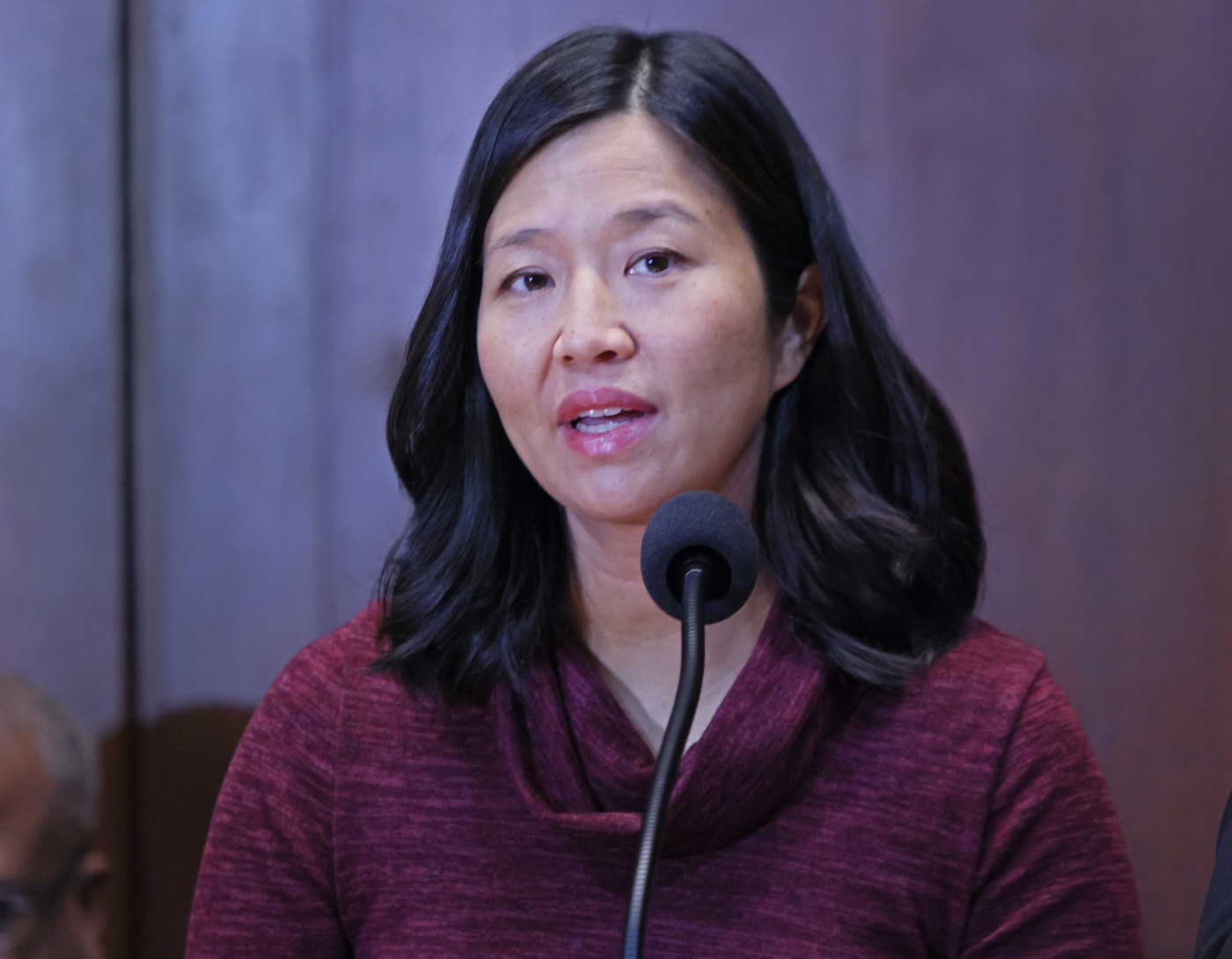
Boston Mayor Wu’s tax relief bill welcomed by ‘struggling’ senior homeowners, but hammered by real estate industry
Boston Mayor Michelle Wu’s decision to try again on legislation aimed at providing residential tax relief offered some peace of mind for senior homeowners reeling from hefty property tax hikes, but rankled a struggling commercial sector.
The “expanded” home rule petition Wu filed Monday with the Boston City Council features many of the elements included in a prior bill that was backed by the Council and House of Representatives but died in the Senate last month.
It sees the mayor hedge her bets, however, by asking for rebates for residents, should lawmakers not back her request to shift more of the tax burden onto businesses by March. The rebate amounts would be subject to approval by the Council and pulled from the city’s rainy day fund — a shift for the administration, per the Boston Policy Institute, which equated them to mid-year budget cuts.
“Many senior homeowners were really shocked to see the large increases in their third quarter bill, and I think, welcome the mayor’s continued efforts to bring relief,” Carolyn Villers, executive director of Mass Senior Action Council, told the Herald. “Many of our members saw increases of more than 40% in their quarterly tax bill, and we even had some members whose tax bills more than doubled.
“We feel really strongly that there needs to be relief, particularly for seniors but also for other homeowners who are struggling with a tax hike,” she added.
Taxes for the average single-family home receiving a residential exemption increased 10.4%, “which is nearly $575 for the year and a 21% bill-to-bill increase,” the mayor’s office said. When expanded to include other residential property types, the average bill-to-bill jump was 30%, her office said.
The mayor’s new legislation seeks the authority to shift more of the city’s tax burden from the residential to commercial sector, beyond what is allowed by state law, to help residents hit with “the single largest jump in the residential share of the property tax levy since 2007,” according to Wu’s office.
The tax hikes in this month’s bills have left many senior homeowners struggling to come up with the additional funds to make their Feb. 3 payment deadline, Villers said. Some have had to forego other necessities, such as by turning down the heat amid a cold spell or cutting back on food, she added.
“Hundreds of senior homeowners were very active, and really urged lawmakers to take action to prevent a spike in taxes in the third quarter, and were really disappointed when that was blocked in the final hour, and frustrated that they felt like some of the lawmakers really didn’t hear the urgency,” Villers said. “Unfortunately now those same senior homeowners are paying the price of that.”
The mayor’s prior tax bill was blocked three times in the Senate by South Boston Democrat Nick Collins, and also drew opposition from William Brownsberger, a powerful Democrat who represents part of Boston. Senate President Karen Spilka delivered the final nail in the coffin last month, by saying she was ending debate due to a lack of consensus.
Part of the opposition cited during that bitter process was reiterated Monday by the Greater Boston Real Estate Board.
“As the Senate declared last year, Boston’s struggling commercial real estate industry should not be held responsible for budgetary shortfalls while grappling with declining building values and daunting vacancy rates,” Greg Vasil, CEO of the industry group, said in a statement. “We continue to urge the City of Boston to explore alternatives to new taxes, such as budget cuts, to meet their financial goals.
“New taxes have been, and continue to be, the wrong approach.”
Marty Walz, interim president of the Boston Municipal Research Bureau expressed support for the rebate aspect of the new petition. Walz was one of the four business stakeholders who backed away from their prior compromise legislation with the mayor following final certifications that showed a lower than projected tax hike for homeowners.
The new bill proposal is based on that prior deal, but was expanded to include increased tax exemptions for small businesses and seniors, along with rebates for homeowners should the Legislature not approve the measure’s new tax rates by March. The new rates would be based on a 181.5% shift this year from homeowners to businesses, rather than the 175% state limit. It would decrease to 180% and 178% in the other two years.
“The Research Bureau is pleased to see Mayor Wu’s interest in the tax relief proposal we put forward eight months ago focused on homeowners who cannot afford their property tax increase,” Walz said in a statement of the rebates. “We encourage the mayor and City Council to pursue it along with smaller spending increases in the FY26 budget.”
Spilka’s office didn’t take a position, saying, “As with all bills filed in a new session, the Senate will review the legislation via the committee process.”
Related Articles
Boston Mayor Wu seeking tax break for homeowners again, this time with rebates on the table
City councilor calls for Boston Police, ICE hearing to answer for detainer request discrepancies
Boston wins MassDEP approval to rebuild Long Island Bridge to combat opioid crisis
Boston Police cite communication issues with feds for immigration detainer discrepancies
Battenfeld: Ed Flynn passes on mayor’s race, removing one obstacle to Michelle Wu’s reelection
The mayor’s home rule petition would first need to pass the City Council, which will likely refer it to committee on Wednesday.
Gabriela Coletta, chair of the City Council’s Government Operations Committee, said she plans to “hold a hearing or more if necessary,” to “thoroughly evaluate the merits of this proposal” in an “inclusive process where all voices are heard.”
“The objective is clear,” Coletta said in a statement. “To protect those who are house-rich, but cash-poor, mitigate displacement risks, and secure the stability of both residential and small business communities.
Ed Flynn, who cast the Council’s lone ‘no’ vote to the mayor’s prior home rule petition last fall, wouldn’t say whether he planned to oppose the latest measure, but did criticize the city’s “non-stop spending programs” for causing today’s problems.
“We can’t sustain that any longer,” Flynn said, while reiterating his prior calls to cut a $4.6 billion city budget that grew by 8% and implement a hiring freeze.
Third-quarter property tax bills were sent on Jan. 1 and payment is due 30 days after they were sent, on Feb. 1. Since the first of the month falls on a weekend, homeowners have until the following Monday, Feb. 3 to pay their tax bills. Payment can be made online, by mail or by phone.
Councilor Ed Flynn.

